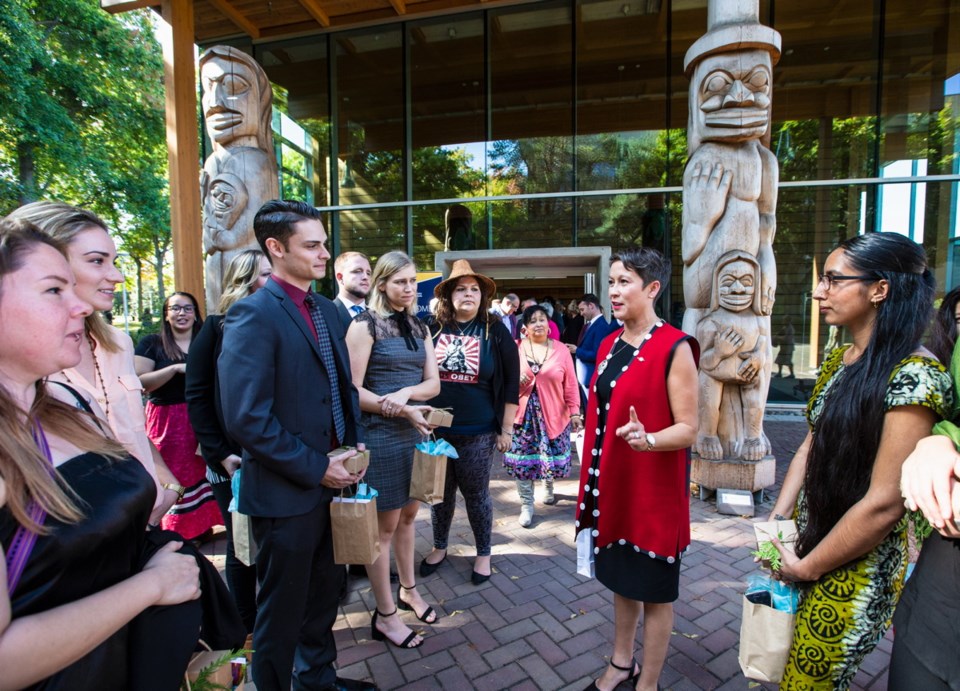The formation of the Indigenous law program at the University of Victoria is being called one of the most outstanding 2018 achievements for those involved in B.C. post-secondary education.
“It’s an incredible moment in time,” said Melanie Mark, B.C.’s minister of advanced education.
“We as Indigenous people have always had laws that have grounded our own governance and our way of life and it’s now being recognized,” said Mark, who is of Nisga’a, Gitxsan, Cree, Ojibway, French and Scottish heritage.
The degree program, starting with 26 students, combines the study of Western legal customs with Indigenous laws and practices.
Graduates of the four-year program hold degrees in Canadian common law and Indigenous legal orders. Students learn how to understand Indigenous legal orders, reason with them, build institutions based on those orders, and design institutions and procedures that work in concert with other levels of Canadian law.
The UVic program began last September.
It is the first of its kind in Canada and fulfils No. 50 of the 94 calls to action issued by the Canadian Truth and Reconciliation Commission: “In keeping with the United Nations Declaration on the Rights of Indigenous Peoples, we call upon the federal government, in collaboration with Aboriginal organizations, to fund the establishment of Indigenous law institutes for the development, use, and understanding of Indigenous laws and access to justice in accordance with the unique cultures of Aboriginal peoples in Canada.”
Susan Breau, UVic’s dean of law, said calls of interest have been pouring in from universities across Canada and around the world. Law schools in Australia, New Zealand and the United States are especially intrigued by what’s happening at UVic.
She said past scholars of Indigenous legal traditions have already been able to identify certain common principles in Indigenous legal custom, often rooted in nature, geographical features like rivers, animals and family. Many of these principles are widely applicable across a variety of First Nations. But that research work has to continue.
Breau is especially proud of the field-research element in the new UVic program. Students are required to spend time in First Nations communities to learn from people like chiefs, councillors and elders about customs, traditions, rules and laws of the community.
Once these Indigenous laws have been identified, recorded and studied they can be applied in a legal setting like a court room or dispute resolution. They can be discussed by lawyers, taken into account by judges and used in the common-law tradition to develop new precedents and interpretations.
Breau said it’s not as if Indigenous laws will start overriding common law. But they deserve to be heard, discussed and applied to reach just solutions and judgments.
“It’s not necessary that there will be a conflict, but there should be a conversation between the Canadian legal system and the Indigenous legal tradition,” she said.
She also hopes other Canadian universities follow UVic’s lead. She points out that UVic cannot possibly research the laws and traditions of approximately 650 Indigenous peoples living within Canada.
Prof. John Borrows, UVic research chair in Indigenous Law, said, at its most basic level, Canadian common law is based on a search for fairness.
“It’s about listening to people’s points of view and testing those against agreed standards,” Borrows said.
But he said for Indigenous Peoples “their perspectives have not been broadly a part of listening to people when they were presenting their case.”
“The principles of law tended to discount their points of view,” said Borrow, who is an Anishinabe/Ojibway member of the Chippewa of the Nawash First Nation in Ontario.
Grand Chief Edward John of the First Nation Summit, an organization of First Nations and tribal summits in B.C., said formation of the combined Indigenous and Canadian common law program at UVic is a good first step in the adaptation of Indigenous law within the Canadian system.
In some ways it already happens. For example, courts have started to recognize adoptions and marriages enacted according to First Nations traditions.
John also cited a principle attributed to Justice Lance Finch, former chief justice of the B.C. Court of Appeal, who said the law has a “duty to learn” when it comes to dealing with Indigenous people.
“And it’s a big learning curve,” he said. “It’s not just a duty to teach at universities but there is a duty to learn for lawyers, for judges, for criminal courts, family courts, civil courts.”
John, who is a lawyer, likes to think of the Canadian legal system as a “plurality” of legal traditions. That means Indigenous traditions and customs can be counted fairly in child and family law, property law and criminal law.
“Law at its essence is about relationships,” he said.
“Ultimately, it’s no more complicated than that.”


